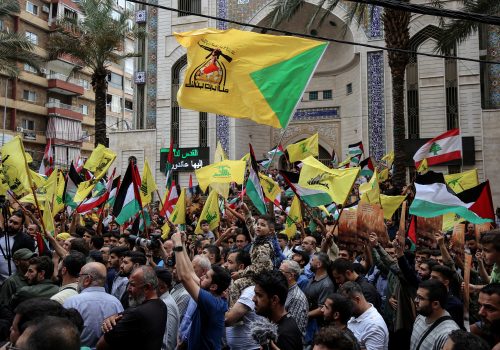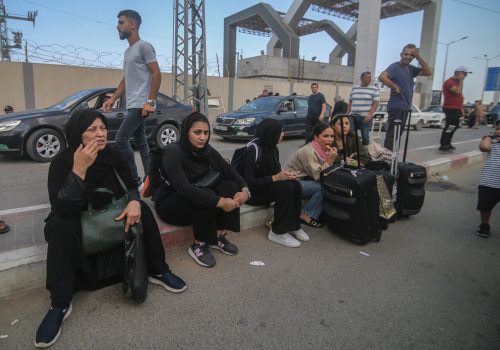Peacemaking can follow the Israel-Hamas war. History shows it.
The leaders of Israel, the Arab states, and the United States should take some critical lessons from past conflicts. True statesmen do not fight wars just to kill more adversaries than their own people lose through fighting. No one can doubt that Israel can kill many times more Palestinians than the number of Israelis that the militant group Hamas killed and took hostage on October 7. The United States has the military means to help Israel do that. However, the real test of leadership is to turn the tragedies of conflict into peacemaking.
Egyptian President Anwar Sadat understood that. When he launched a surprise attack in October 1973—along with Syria and eventually a coalition of other Arab states to recover territories lost to Israel after Israel’s own surprise attack in June 1967 wiped out most of the Egyptian air forces—I was part of the State Department team that helped Secretary Henry Kissinger’s diplomacy bring Egypt and Israel to a standoff and a ceasefire. Sadat did not accept that status quo, leaving Israel to occupy the Sinai Peninsula. Instead, the Egyptian president found innovative ways to reach out to both the United States and Israel, culminating with his historic visit to Jerusalem to address the Israeli Knesset.
President Jimmy Carter took it from there. He brought Sadat and Israeli Prime Minister Menachem Begin to Camp David in September 1978 for twelve days of secret talks that led to the March 26, 1979 peace treaty between their two countries, known as the Camp David Accords.
Another American president showed a similar instinct for turning military victory into peacemaking. Under the leadership of President George H.W. Bush, Operations Desert Shield and Desert Storm during 1990-1991 led to the expulsion of the Iraqi armed forces in February 1991 that had occupied Kuwait and done horrendous damage. Some, including officials in his administration, called for US forces to march on to Baghdad and overthrow Iraqi dictator Saddam Hussein. President Bush resisted those proposals, opting to keep Iraq contained within its borders.
After being heavily involved in the efforts to muster near total global support to defeat the Iraqi aggression of 1990, I watched in awe as President Bush and Secretary of State James Baker capitalized on the immense prestige that the United States achieved in early 1991 to launch the Madrid Conference on October 30, 1991. They brought initially reluctant Arabs and Israelis together to address their decades-old conflict.
The skill shown in subsequent years of diplomacy included the Oslo Process of 1993-1995 between Israel and the Palestinian Liberation Organization (PLO), which led to the establishing of the Palestinian Authority in the West Bank and an initially promising period of security cooperation between Israel and the PLO. There were still unrealized hopes for a peace process leading to a two-state solution. The Madrid Conference also set the stage for Jordan’s peace treaty with Israel on October 26, 1994.
Together, these developments—plus the earlier Camp David Accords—were the prelude to what is now referred to as normalization. The Donald Trump administration jumped on that process in 2020 and 2021, mediating and offering inducements to the United Arab Emirates, Bahrain, Morocco, and Sudan to establish diplomatic relationships with Israel. The administration also came up with the catchy title of the Abraham Accords—a title that appeals to Christians, Muslims, and Jews. The Joe Biden administration has honored the agreements, which may lead to other participants, notably Saudi Arabia.
Now, there is another war involving Israel and the Palestinians. Immediately following the tragic conflict set off by Hamas terrorism on October 7, the initial rhetoric of President Biden, Secretary Antony Blinken, and others in the administration was heavy on pledges of US military support for Israel’s already overwhelming military superiority in the region. The United States has moved a high level of military assets into the Eastern Mediterranean to deter other anti-Israel states or movements from joining in what is, so far, the latest and most destructive in a series of conflicts arising every few years between Israel and Hamas, whose political leadership and military wing have dominated Gaza ever since 2006 and opposes the Palestinian Authority headquartered in Ramallah in the West Bank.
One week after the initiation of terrorist actions by Hamas, after intensive and skillful diplomacy by Secretary Blinken, his lightening tour to the capitals of Arab partners in the region and back to Jerusalem is bearing fruit. The focus on saving the lives of Americans has now widened to saving the lives of innocent civilians of all nationalities, including Palestinians. Involvement in the armed conflict by others, including the Islamic Republic of Iran and the movements Tehran supports—such as Lebanese Hezbollah—seems less and less inevitable.
On October 15, Blinken’s remarks in Cairo offered strong hints that peacemaking could follow the end of the current fighting. The US secretary of state noted his “good conversations” with Crown Prince Mohamed Bin Salman of Saudi Arabia and Egyptian President Abdel Fattah el-Sisi on the path forward, including a Cairo-led conference to defuse the situation and “help get assistance to Palestinians who need it” that “can look at ways to ensure that this conflict doesn’t spread.”
May it be so.
David Mack is a nonresident senior fellow with the Atlantic Council’s Middle East Programs, a former deputy assistant secretary of state for Near East affairs, and a former US ambassador to the United Arab Emirates.
Further reading
Mon, Oct 16, 2023
Hamas’s actions are war crimes. Israel should not respond with further war crimes.
MENASource By Elise Baker
There are clear indications that both Hamas and the IDF have violated international humanitarian law, and some of their attacks constitute grave violations.
Wed, Oct 11, 2023
Hamas’s attack on Israel was straight out of Hezbollah’s playbook
MENASource By David Daoud
The genesis of Operation Al-Aqsa Flood appears to originate with Hezbollah, at least in part. The pressing question now is what will Hezbollah do next?
Sat, Oct 14, 2023
Egypt cornered over Israel’s war on Hamas
MENASource By Shahira Amin
Whether Egyptian President Abdel Fattah el-Sisi will bow under US and Israeli pressure remains to be seen.
Image: U.S. President Jimmy Carter, Egyptian President Anwar Sadat and Israeli Prime Minister Menachem Begin join hands in celebration of the signing of the ÒTreaty of Peace Between the Arab Republic of Egypt and the State of IsraelÓ at the White House in Washington, D.C., March 26, 1979. Courtesy Jimmy Carter Library/National Archives/Handout via REUTERS


